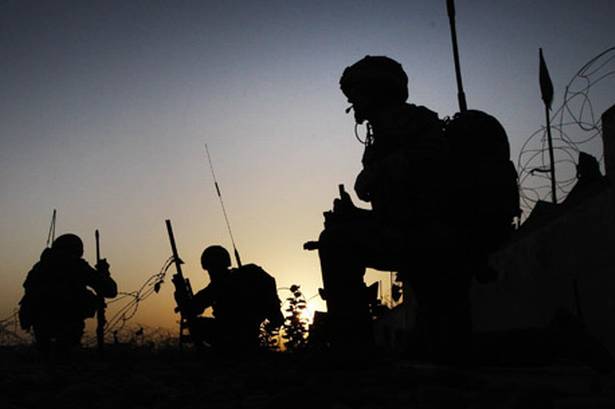President Barack Obama recently announced that, following the end of major combat operations in Afghanistan this year, the United States will retain a residual force of 9,800 troops to continue to train local security forces and conduct counterterrorism operations. Under this new plan, the number of troops in Afghanistan will continue to decline until Fiscal Year 2017 when all U.S. troops will be redeployed.
The White House had been holding back the announcement while awaiting the final results of the presidential election in Afghanistan, in which both leading candidates have pledged to support a long-term security agreement, known as a Bilateral Security Agreement, to authorize a U.S.-led military presence in the country after 2014. But with pressure mounting in Congress for the President to declare a path forward, he has decided to pull the trigger and announce his commitment to a residual force of 9,800 troops.
While the Pentagon submitted its regular base budget request back in March, it held back on submitting the Overseas Contingency Operations (OCO), also known as war funding, request pending the results of the Afghan election and the President’s announcement on troop levels.
It’s important that the administration’s forthcoming OCO funding request reflect the President’s vision for a significantly truncated force in Afghanistan next year. As William Hartung of the Center for International Policy points out, “In recent years, the OCO budget has been saddled with tens of billions of dollars in expenditures that are unrelated to the war in Afghanistan or any other overseas contingency.”
For example, last year, the number of troops deployed to Afghanistan fell by almost forty percent, but the amount of war funding provided actually increased in nominal terms from $82 billion to $85.2 billion. This was largely due to an increase in war funding provided by Congress to help the Pentagon circumvent statutory spending caps that have constrained growth in the defense budget. As a result, the OCO account has become a slush fund that supports activities and assets unrelated to counterterrorism operations in Afghanistan. For example, earlier this year, the Air Force used OCO funds to replace a V-22 Osprey that had crashed during a training exercise in Florida.
Currently, there are no statutory restrictions on what activities or programs may be included in the OCO account. Fortunately, concern over the OCO slush fund has been growing in Congress. The recent slush fund gimmickry has caught the attention of Representatives Mick Mulvaney (R-SC) and Patrick Murphy (D-FL) who successfully offered an amendment to the National Defense Authorization Act (NDAA) that would codify metrics developed by the Office of Management and Budget to determine what should and should not be funded through the OCO account. For example, this amendment would authorize the military to use the account only to replace aircraft that have been destroyed in combat.
The primary purpose of the OCO account is to fund unexpected contingency operations to which Congress and military budget planners cannot respond quickly enough. Regrettably, though, the OCO account is now being used to support long-term, so-called “enduring” missions. According to senior military officials, war funding is now being used to support operations in Africa, global ship deployments, and operational costs for the detention facility in Guantanamo Bay, Cuba. The Mulvaney-Murphy amendment would crack down on this trend by restricting the ability of the Pentagon to spend war funds outside of certain geographic areas.
Representatives Mulvaney and Murphy were recently joined by a group of twenty-two lawmakers in writing to the President requesting that he reduce war funding as major combat operations in Afghanistan draw to a close. “As the last of our troops prepare to come home, it is also time to wind down the OCO budget and fund the operations of the Defense Department entirely through the base budget,” the bipartisan group wrote.
So, with the Pentagon in the final stages of preparing its OCO budget request for Fiscal Year 2015, the question remains: how much funding should be provided for the war in Afghanistan?
During previous budget cycles, the annual per troop cost has been pegged at around $1.3 million according to Todd Harrison of the Center for Strategic and Budgetary Assessments. Based on historic funding trends, Harrison estimates that maintaining a force of 9,800 troops should cost around $20 billion. “Twenty billion [dollars] is a reasonable estimate for what it will cost for 9,800 troops in Afghanistan next year. It’s a legitimate number. In fact, it’s a little above the trend line, but pretty close to it,” Harrison told Defense News.
Indeed, the President’s Deputy National Security Advisor has also suggested that the Pentagon will need around $20 billion to prosecute the war in Afghanistan and draw down to a force of 9,800 personnel next year. An additional $5 billion will likely be required to support the retrograde of equipment out of Afghanistan. Yet, what remains to be seen is whether Congress’s propensity for padding the war funding account with unrelated activities and programs wins out over prudent and accountable budgeting.
Both Congress and the Pentagon must avoid the temptation of adding billions of dollars in unrelated expenses to the OCO account. The Senate can help end this practice by adopting the Mulvaney-Murphy OCO language in its version of the NDAA.
Furthermore, the Pentagon should request, and Congress should appropriate, a reasonable level of funding close to the $20-25 billion likely needed to support continued counterterrorism activities in Afghanistan. However, this $20-25 billion figure should be seen as a ceiling, not a floor, and the Pentagon can and should do everything possible to bring down costs in a safe and responsible manner.
Should lawmakers appropriate at a level above that requested by military planners, the Project On Government Oversight will vigorously support efforts to bring that funding level in line with what is needed to close out the longest war in American history. Last year, an amendment offered by Representatives Mulvaney and Chris Van Hollen (D-MD) did just that, and enjoyed broad bipartisan support on the House floor.











